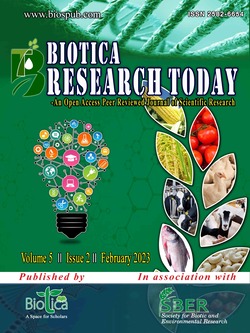
Strigolactone: A Novel Class of Plant Hormone with Immense Possibilities
Proharsha Dey
Dept. of Botany (Postgraduate), Ramakrishna Mission Vivekananda Centenary College, Rahara, Kolkata, West Bengal (700 118), India
Soumyabroto Karmakar
Dept. of Botany (Postgraduate), Ramakrishna Mission Vivekananda Centenary College, Rahara, Kolkata, West Bengal (700 118), India
Anirban Bhar*
Dept. of Botany (Postgraduate), Ramakrishna Mission Vivekananda Centenary College, Rahara, Kolkata, West Bengal (700 118), India
DOI: NIL
Keywords: Hormone, Plant stress, Strigolactone, Sustainable agriculture
Abstract
Strigolactones are a group of chemical compounds produced in plant roots. Due to their mechanism of action, these molecules have been classified as plant hormones. Strigolactones (SLs) are carotenoid-derived signaling molecules that primarily instigate the germination of root-parasitic plants and symbiotic fungi. Hence, the SLs act as the chemical identifier for the parasites and arbuscular fungi to detect their host plants. Further studies have identified many diverse functions of SLs in the physiology and development of plants. Due to their multiple roles, these hormones are suitable targets for sustainable agricultural applications. Besides, in the last few years, studies have provided clues about some unique natures of SLs in therapeutics, e.g., anti-cancer agents, glucose metabolism, etc. These functions of SL can also potentially be utilized in diagnostics and medication in near future.
Downloads
not found
Reference
Alvi, A.F., Sehar, Z., Fatma, M., Masood, A., Khan, N.A., 2022. Strigolactone: an emerging growth regulator for developing resilience in plants. Plants 11, 2604. DOI: https://doi.org/10.3390/plants11192604.
Dell’Oste, V., Spyrakis, F., Prandi, C., 2021. Strigolactones, from plants to human health: achievements and challenges. Molecules 26, 4579. DOI: https://doi.org/10.3390/molecules26154579.
Mashiguchi, K., Seto, Y., Yamaguchi, S., 2021. Strigolactone biosynthesis, transport and perception. The Plant Journal 105, 335-350. DOI: https://doi.org/10.1111/tpj.15059.
Mishra, S., Upadhyay, S., Shukla, R.K., 2017. The role of strigolactones and their potential cross-talk under hostile ecological conditions in plants. Frontiers in Physiology 7, 691. DOI: https://doi.org/10.3389/fphys.2016.00691.
Yoda, A., Mori, N., Akiyama, K., Kikuchi, M., Xie, X., Miura, K., Yoneyama, K., Sato‐Izawa, K., Yamaguchi, S., Yoneyama, K., Nelson, D.C., 2021. Strigolactone biosynthesis catalyzed by cytochrome P450 and sulfotransferase in sorghum. New Phytologist 232, 1999-2010. DOI: https://doi.org/10.1111/nph.17737.
